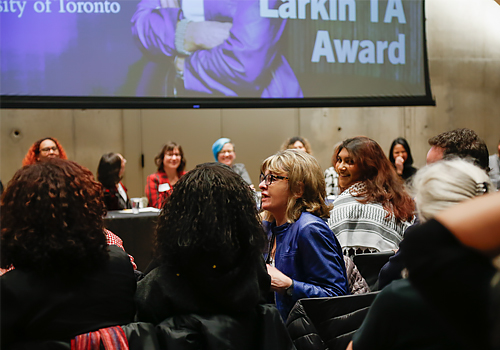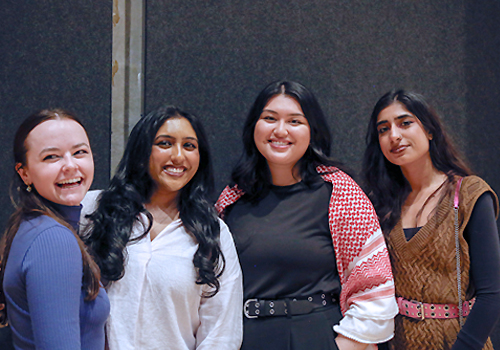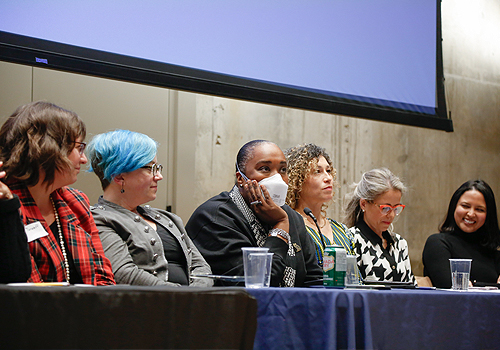The 13 panelists at “50 Years of WGSI Alumni: An International Women’s Day Panel” all shared a deep appreciation for everything they learned during their time at Arts & Science.
William Doo Auditorium was packed with current Women & Gender Studies Institute (WGSI) students, alumni and esteemed former faculty members, all in celebration of 50 years of WGSI graduates. The panel included alumni CEOs, health care practitioners, politicians, lawyers and more.
The event was also a celebration of the June Larkin TA Award, established in honour of the venerated former faculty member. Panelists shared transformative memories of being taught by Larkin and other WGSI professors, such as Director Alissa Trotz.
After introductions, moderators from the Women & Gender Studies Student Union, who were the organizers of the event, asked panelists how their studies at WGSI inform their work today. Here’s what they had to say:
Pamela Uppal-Sandhu, who earned her honours bachelor of arts in 2012 as a member of Woodsworth College, and Winnie Luk, who earned her bachelor of arts in 2002 as a member of Victoria College, were asked how meaningful feminist work can be done in the non-profit space, which often benefits from legacies of colonialism and white saviourism.

“We need efforts for transformative change to happen everywhere, on all fronts,” says Uppal-Sandhu, director of policy at the Ontario Nonprofit Network. “We need protests; we need education; we need the nonprofit sector; we need public policy advocacy; we need research; we need everything because the type of systems we're trying to change are centuries in the making.”
“When you are working in organizations that align with your values and you feel passionate about the work, it’s much more fulfilling,” says Luk, executive director at the Disability Screen Office. “Work is still work — you have to make money — but it makes your work and your practices that much more authentic and thoughtful. And it shows.”
Sarah Edo, who earned her honours bachelor of arts in 2019 as a member of Trinity College, and Aida Jordão, who earned her bachelor of arts in 2000 as a member of Woodsworth College, were asked about the role of resistance in their work as artists.
"While I was doing my graduate studies, I realized the importance of relationships and trust building,” says Edo, a curatorial fellow at Toronto Biennial of Art. “For me, that often looks like cultural work. I think of cultural work as being in support of the artistic production that is in service to resistance movements."

“Heteronormativity is a terrible problem and fighting binarism is really vital right now and topical,” says Jordão, a teacher of theatre community arts and Portuguese literature at York University. “I teach my students how to rehearse the revolution against gender oppression.”
Lesley Tarasoff, who earned her master of arts in 2010, and Amy Alexander, who earned their bachelor of arts in 2000 as a member of University College, were asked about how their education in women and gender studies informs their work in health care.
"A lot of what I learned from women and gender studies has informed the research, program and policy work that I do,” Tarasoff says of her program of perinatal health and disability research and work with the Provincial Council for Maternal and Child Health. “A number of others have also already raised the importance of including community voices and ‘nothing about us without us.’”
“I primarily practice in psychiatry and psychotherapy, and my learning in women and gender studies now really informs how I talk to people about ways in which the intersections of their lives influence their mental health,” says Alexander, a family physician.
Jill Andrew, who earned her master of arts in 2008, Carita Wong, who earned her bachelor of arts in 1997 as a member of New College, and Lisa Gomes, who earned her honours bachelor of arts in 2005 as a member of St. Michael’s College, were asked how their work relates to women and gender studies.

“I say this whenever I have a chance to speak to students,” says Andrew, an Ontario MPP. “Please consider politics. There are 124 members of provincial parliament. About 37 per cent of them, give or take, are women-identified. Six of us out of 124 are Black folks. Queer folks and gender diverse folks are about four, including myself. If we're not at the table, we are on the menu. When we are elected, we have a better chance of our voices being heard and at having our needs and priorities addressed through intersectional, anti-oppressive politics. Representation Matters.”
“It's something I've talked to a lot of lawyers about,” says Wong, a labour and employment lawyer. “I help them in thinking outside the box and thinking differently about how we can approach recognizing these very real gender differences and how they can be barriers to what we do.”
“My undergrad in this faculty was transforming in the work I do each and every day, with the families I serve and the communities I work in,” says Gomes, a principal in the Toronto Catholic School Board. “The intro to women and gender studies course, even today, helps me when I'm listening to the stories of students in my community and families I meet with each and every day.”
Chelsea Fung, who earned her honours bachelor of arts in 2012 as a member of New College, and Azrah Manji-Savin, who earned her honours bachelor of arts in 2012 as a member of Trinity College, were asked to reflect on a project or moment that reminded them of why they do what they do in their roles creating spaces.
“We've created this space that is truly transformative, and it's a space where the majority of us are women,” Fung says of her company, RED Entertainment, based in Guyana. “We've created our own family and work environment where we can thrive, where we can break down barriers in a system that is very antiquated.”
“Only 1.9 per cent of venture capital goes to women CEOs and 0.3 per cent goes to women of colour,” says Manji-Savin, CEO of Syzl. “So, I do this even though it's an uphill battle every single day. Because I want to provide that safe space. I want to provide space for my mother, for my grandmother, for my uncle and for everybody else. And this all comes back to women and gender studies.”
Abinaya Balasubramaniam, who earned her honours bachelor of arts in 2014 as a member of Woodsworth College, and Sheena Kitchemokman, who earned her bachelor of arts in 2017 as a member of University College, were asked how their experiences influenced their conceptualization of “home.”
“From my own journey of finding a home — that can mean a career, a partnership, a place where we belong — and, from what I've heard from you, we all know a home is something that should be accessible to all,” says Balasubramaniam, a researcher at the Wellesley Institute specializing in housing and health equity. “Even though housing is a universal human right, it's denied to so many people.”
“There are different meanings to me about where my home is,” says Kitchemokman, an outreach worker at Thunder Woman Healing Lodge Society, a home for Indigenous woman exiting the correction system. “I am in between my community home, where my family is or whether Toronto is home. I had this issue with understanding that and trying to say, what is home? I can say I feel at home here because I feel really supported by my community in Toronto.”

